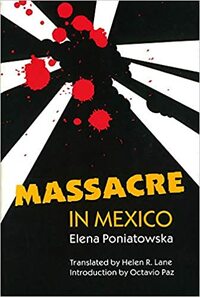Take a photo of a barcode or cover
dark
emotional
informative
sad
slow-paced
Graphic: Death, Police brutality
Moderate: Child death, Blood
challenging
dark
Lectura para Narrativa Latinoamericana II
Terminado de leer en el aniversario número 54 de la masacre genocida.
Terminado de leer en el aniversario número 54 de la masacre genocida.
Graphic: Genocide, Torture, Police brutality, Mass/school shootings
El libro está dividido en dos partes, la primera es Ganar la calle, que habla sobre los sucesos anteriores al 2 de octubre y sobre algunas experiencias en prisión de los detenidos, ya fueran torturas, la forma en la que los identificaron o la vida cotidiana. La segunda parte es La noche de Tlatelolco, que trata sobre ese día y las reacciones posteriores, lo que decían los periódicos, los periodistas que estaban cubriendo el mitín y las madres desesperadas tratando de encontrar a sus hijos.
Cada parte está conformada por testimonios de civiles que no tenían que ver con el movimiento, de personas del Consejo Nacional de Huelga, familiares y algunos militares o policías. Estos testimonios se presentan fragmentados, para dar un cierto sentido cronológico. La primera parte está bien, pero en la segunda falla un poco el orden en que son presentados, porque se repiten o porque todo va in crescendo y justo cuando llegué al punto que para mí era más catártico, como que cambia el tema y la intensidad baja y se sintió inconcluso, por más que luego se haya retomado.
Para leer más: https://bitviajera.blogspot.com/2014/10/libro-la-noche-de-tlatelolco.html
Cada parte está conformada por testimonios de civiles que no tenían que ver con el movimiento, de personas del Consejo Nacional de Huelga, familiares y algunos militares o policías. Estos testimonios se presentan fragmentados, para dar un cierto sentido cronológico. La primera parte está bien, pero en la segunda falla un poco el orden en que son presentados, porque se repiten o porque todo va in crescendo y justo cuando llegué al punto que para mí era más catártico, como que cambia el tema y la intensidad baja y se sintió inconcluso, por más que luego se haya retomado.
Para leer más: https://bitviajera.blogspot.com/2014/10/libro-la-noche-de-tlatelolco.html
Un documento periodístico imprescindible para entender de primera mano el movimiento estudiantil del 68 y su culminación en la terrible masacre de Tlatelolco. Leer las voces frescas de los que vivieron el movimiento de primera mano, no más de 2 años después de la tragedia, ayuda a dar una perspectiva de todo lo que pasó durante aquellos meses y que dieron forma, en mayor o menor medida, al México actual.
dark
reflective
sad
tense
medium-paced
Nota: favor de leerlo mínimo una vez en la vida, sobre todo si eres mexicano.
"Es el grito mudo que se atoró en miles de gargantas, en miles de ojos desorbitados por el espanto"
challenging
dark
emotional
informative
sad
slow-paced
challenging
dark
informative
inspiring
reflective
sad
tense
medium-paced
Haunting. For anyone vaguely aware of contemporary Mexican history, you'll know that the student movement if 1968 and the subsequent government repression, culminating in the massacre at Tlatelolco, left an enormous scar on the political and moral conscience of that country. When I was living in Mexico as a student in 2006-2007, there was a popular uprising in protest of the presidential election of 2006, and there were, among the million or so people occupying the capital, several banners and flags declaring the holders to be veterans of 1968. And as most violent political repression does, this was the first real crack in the domination of the PRI as the preeminent political party in México. It took another 30+ years to elect someone outside of that party, but it's hard to massacre hundreds of students at a peaceful protest while maintaining any veneer of progressive moral high ground.
Anyway, I digress. The real reason I'm here is to praise the work of Elena Poniatowska, who may be my favorite living author. Her collection of statements and memories of Tlatelolco and the events which led to it, while of course conflicting, are still the best way to really experience what happened (short of being present for it). The style she uses, of taking fragments of statements given to her - and honestly bless those family members and friends who were willing to recall such a nightmare fo the sake of public memory - slowly immerses the reader so you really feel like you're experiencing the events alongside these very real people. She moves effortlessly and logically from statements all in agreement to juxtaposing recollections of those on the ground with press coverage and government/military statements at the time. Conflicting statements from students, activists, soldiers, and some random observers truly create a visual, visceral experience.
I personally liked her similar "Nothing, nobody: Voices of the Mexico City earthquake" a bit better, but this is still an absolute gem, which anyone interested in contemporary history, activist politics, the Cold War, Mexico, civil rights, etc., should absolutely read.
Anyway, I digress. The real reason I'm here is to praise the work of Elena Poniatowska, who may be my favorite living author. Her collection of statements and memories of Tlatelolco and the events which led to it, while of course conflicting, are still the best way to really experience what happened (short of being present for it). The style she uses, of taking fragments of statements given to her - and honestly bless those family members and friends who were willing to recall such a nightmare fo the sake of public memory - slowly immerses the reader so you really feel like you're experiencing the events alongside these very real people. She moves effortlessly and logically from statements all in agreement to juxtaposing recollections of those on the ground with press coverage and government/military statements at the time. Conflicting statements from students, activists, soldiers, and some random observers truly create a visual, visceral experience.
I personally liked her similar "Nothing, nobody: Voices of the Mexico City earthquake" a bit better, but this is still an absolute gem, which anyone interested in contemporary history, activist politics, the Cold War, Mexico, civil rights, etc., should absolutely read.
Uno de mis grandes pendientes en la vida era leer este libro. La noche de Tlatelolco es un conjunto de voces, pedazos de declaraciones, entrevistas, titulares de periódicos, voces de la gente "de a pie" que vivieron Tlatelolco. Es un antes y un después. Totalmente recomendado.







